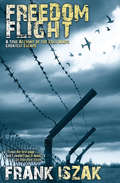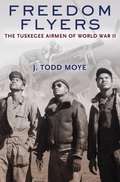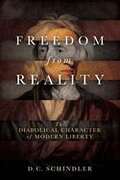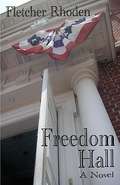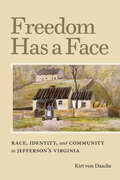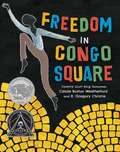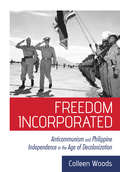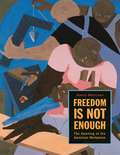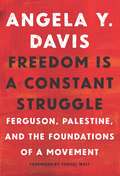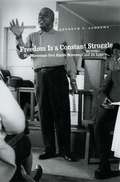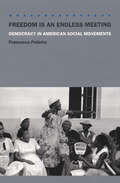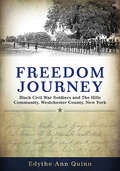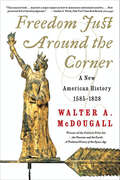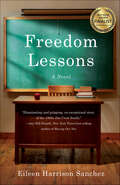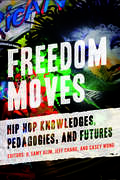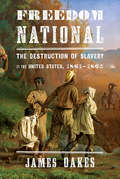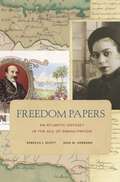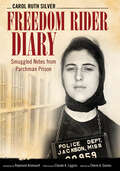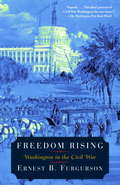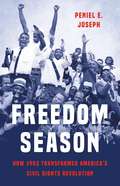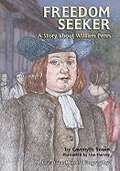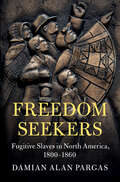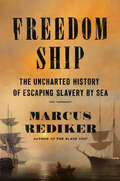- Table View
- List View
Freedom Flight: A True Account of the Cold War's Greatest Escape
by Frank IszakA riveting account of a daring escape from Communist Hungary in a twin-engine plane: &“I couldn&’t put it down&” —San Diego Union-Tribune. On the rainy afternoon of Friday, July 13, 1956, seven desperate young people boarded a twin engine DC-3 in the People&’s Republic of Hungary, with the intention of diverting it to West Germany. They had no weapons, no map, and no idea whether the plane carried enough fuel to get them there. They would have to brave the gun of the security officer on board, the wild maneuvers of the pilot, the Russian MiG fighters in hot pursuit, and a harrowing flight over the stormy Alps, without navigation. Failure would mean certain death. And a spectacular escape from tyranny was born . . .
Freedom Flyers: The Tuskegee Airmen of World War II
by J. Todd MoyeAs the country's first African American military pilots, the Tuskegee Airmen fought in World War II on two fronts: against the Axis powers in the skies over Europe and against Jim Crow racism and segregation at home. Although the pilots flew more than 15,000 sorties and destroyed more than 200 German aircraft, their most far-reaching achievement defies quantification: delivering a powerful blow to racial inequality and discrimination in American life. In this inspiring account of the Tuskegee Airmen, historian J. Todd Moye captures the challenges and triumphs of these brave pilots in their own words, drawing on more than 800 interviews recorded for the National Park Service's Tuskegee Airmen Oral History Project. Denied the right to fully participate in the U. S. war effort alongside whites at the beginning of World War II, African Americans--spurred on by black newspapers and civil rights organizations such as the NAACP--compelled the prestigious Army Air Corps to open its training programs to black pilots, despite the objections of its top generals. Thousands of young men came from every part of the country to Tuskegee, Alabama, in the heart of the segregated South, to enter the program, which expanded in 1943 to train multi-engine bomber pilots in addition to fighter pilots. By the end of the war, Tuskegee Airfield had become a small city populated by black mechanics, parachute packers, doctors, and nurses. Together, they helped prove that racial segregation of the fighting forces was so inefficient as to be counterproductive to the nation's defense. Freedom Flyersbrings to life the legacy of a determined, visionary cadre of African American airmen who proved their capabilities and patriotism beyond question, transformed the armed forces--formerly the nation's most racially polarized institution--and jump-started the modern struggle for racial equality.
Freedom For the Thought That We Hate: A Biography of the First Amendment
by Anthony R. Lewis[From the book jacket] Congress shall make no law. . . abridging the freedom of speech, or of the press. . . More than any other people on earth, Americans are free to say and write what they think. They can criticize the White House or air the secrets of the bedroom with little fear of punishment. This extraordinary freedom is based on just fourteen words in our Constitution: the free expression clauses of the First Amendment. But the freedom we now take for granted did not take hold when the First Amendment was added to the Constitution in 1791. It was more than a century later, in 1931, when the Supreme Court first enforced the Amendment to protect speakers and the press. Since then judges have interpreted the sweeping language of the First Amendment to build a great structure of American liberty. In Freedom for the Thought That We Hate, Pulitzer Prizewinning journalist Anthony Lewis tells the story of legal and political conflict, hard choices, and determined, sometimes eccentric Americans who led the legal system to realize one of America's great founding ideas. In this, his first book in seventeen years, Anthony Lewis reminds us all that even our most basic freedoms as Americans have been secured through long struggle-by judges, lawyers, activists and ordinary citizens-and should never be taken for granted.
Freedom From Reality: The Diabolical Character of Modern Liberty (Catholic Ideas for a Secular World Series)
by D. C. SchindlerIt is commonly observed that behind many of the political and cultural issues that we face today there are impoverished conceptions of freedom, which, according to D. C. Schindler, we have inherited from the classical liberal tradition without a sufficient awareness of its implications. <p><p>Freedom from Reality presents a critique of the deceptive and ultimately self-subverting character of the modern notion of freedom, retrieving an alternative view through a new interpretation of the ancient tradition. While many have critiqued the inadequacy of identifying freedom with arbitrary choice, this book seeks to penetrate to the metaphysical roots of the modern conception by going back, through an etymological study, to the original sense of freedom.
Freedom Hall: A Novel
by Fletcher RhodenInspired by actual events, Freedom Hall is the story of abolitionist Evangeline "Vangie" Mott, who enlists a township of free African/Americans to construct an abolitionist hall in central Boston during the peak of the antebellum era. The issues of integrity, equality, dedication and liberty are as vital in the 21st Century as they were in the trying years leading up to the American Civil War. Author Fletcher Rhoden's historical fiction, whose subjects have included Marlon Brando, Davy Crockett and Lucille Ball, has been called, "Amazingly well written. . . incredibly believable dialogue throughout. . . thoughtful yet riveting from the first page to the last. . . a must-read and not to be missed. . . " by critics in print and online. Includes excerpts from other Fletcher Rhoden books
Freedom Has a Face: Race, Identity, and Community in Jefferson's Virginia (Carter G. Woodson Institute Series)
by Kirt von DaackeIn his examination of a wide array of court papers from Albemarle County, a rural Virginia slaveholding community, Kirt von Daacke argues against the commonly held belief that southern whites saw free blacks only as a menace. Von Daacke reveals instead a more easygoing interracial social order in Albemarle County that existed for more than two generations after the Revolution—stretching to the mid-nineteenth century and beyond—despite fears engendered by Gabriel’s Rebellion and the Haitian Revolution.Freedom Has a Face tells the stories of free blacks who worked hard to carve out comfortable spaces for existence. They were denied full freedom, but they were neither slaves without masters nor anomalies in a society that had room only for black slaves and free white citizens. A typical rural Piedmont county, Albemarle was not a racial utopia. Rather, it was a tight-knit community in which face-to-face interactions determined social status and reputation. A steep social hierarchy allowed substantial inequalities to persist, but it was nonetheless an intimately interracial society. Free African Americans who maintained personal connections with white neighbors and who participated openly in local society were perceived as far more than stereotypical dangerous blacks.Based on his work building a cross-referenced database containing individual records for nearly five thousand documents, von Daacke reveals a detailed picture of daily life in Albemarle County. With this reinsertion of individual free blacks into the neighborhood, community, and county, he exposes a different, more complicated image of the lives of free people of color.
Freedom In Congo Square
by Carole Boston Weatherford R. Gregory ChristieChosen as a New York Times Best Illustrated Book of 2016, this poetic, nonfiction story about a little-known piece of African American history captures a human's capacity to find hope and joy in difficult circumstances and demonstrates how New Orleans' Congo Square was truly freedom's heart.
Freedom Incorporated: Anticommunism and Philippine Independence in the Age of Decolonization (The United States in the World)
by Colleen WoodsFreedom Incorporated demonstrates how anticommunist political projects were critical to the United States' expanding imperial power in the age of decolonization, and how anticommunism was essential to the growing global economy of imperial violence in the Cold War era.In this broad historical account, Colleen Woods demonstrates how, in the mid-twentieth century Philippines, US policymakers and Filipino elites promoted the islands as a model colony. In the wake of World War II, as the decolonization movement strengthened, those same political actors pivoted and, after Philippine independence in 1946, lauded the archipelago as a successful postcolonial democracy. Officials at Malacañang Palace and the White House touted the 1946 signing of the liberating Treaty of Manila as a testament to the US commitment to the liberation of colonized people and celebrated it under the moniker of Philippine–American Friendship Day. Despite elite propaganda, from the early 1930s to late 1950s, radical movements in the Philippines highlighted US hegemony over the new Republic of the Philippines and, in so doing, threatened American efforts to separate the US from sordid histories of empire, imperialism, and the colonial racial order.Woods finds that in order to justify US intervention in an ostensibly independent Philippine nation, anticommunist Filipinos and their American allies transformed local political struggles in the Philippines into sites of resistance against global communist revolution. By linking political struggles over local resources, like the Hukbalahap Rebellion in central Luzon, to a war against communism, American and Filipino anticommunists legitimized the use of violence as a means to capture and contain alternative forms of political, economic, and social organization. Placing the post-World War II history of anticommunism in the Philippines within a larger imperial framework, in Freedom Incorporated Woods illustrates how American and Filipino intelligence agents, military officials, paramilitaries, state bureaucrats, academics, and entrepreneurs mobilized anticommunist politics to contain challenges to elite rule in the Philippines.
Freedom Is Not Enough: The Opening of the American Workplace
by Nancy MacLeanIn the 1950s, the exclusion of women and of black and Latino men from higher-paying jobs was so universal as to seem normal to most Americans. Today, diversity in the workforce is a point of pride. How did such a transformation come about? In this bold and groundbreaking work, Nancy MacLean shows how African-American and later Mexican-American civil rights activists and feminists concluded that freedom alone would not suffice: access to jobs at all levels is a requisite of full citizenship. Tracing the struggle to open the American workplace to all, MacLean chronicles the cultural and political advances that have irrevocably changed our nation over the past fifty years. Freedom Is Not Enough reveals the fundamental role jobs play in the struggle for equality. We meet the grassroots activists—rank-and-file workers, community leaders, trade unionists, advocates, lawyers—and their allies in government who fight for fair treatment, as we also witness the conservative forces that assembled to resist their demands. Weaving a powerful and memorable narrative, MacLean demonstrates the life-altering impact of the Civil Rights Act and the movement for economic advancement that it fostered. The struggle for jobs reached far beyond the workplace to transform American culture. MacLean enables us to understand why so many came to see good jobs for all as the measure of full citizenship in a vital democracy. Opening up the workplace, she shows, opened minds and hearts to the genuine inclusion of all Americans for the first time in our nation’s history.
Freedom Is a Constant Struggle: Ferguson, Palestine, and the Foundations of a Movement
by Angela Y. Davis Frank BaratIn these newly collected essays, interviews, and speeches, world-renowned activist and scholar Angela Y. Davis illuminates the connections between struggles against state violence and oppression throughout history and around the world. Reflecting on the importance of black feminism, intersectionality, and prison abolitionism for today's struggles, Davis discusses the legacies of previous liberation struggles, from the Black Freedom Movement to the South African anti-Apartheid movement. She highlights connections and analyzes today's struggles against state terror, from Ferguson to Palestine. Facing a world of outrageous injustice, Davis challenges us to imagine and build the movement for human liberation. And in doing so, she reminds us that "Freedom is a constant struggle. "
Freedom Is a Constant Struggle: The Mississippi Civil Rights Movement and Its Legacy
by Kenneth T. AndrewsNo part of the United States was more resistant to the civil rights movement and its pursuit of racial equality than Mississippi. Freedom Is a Constant Struggle explores the civil rights movement in that state to consider its emergence before the 1965 Voting Rights Act and its impact long after. Did the civil rights movement have a lasting impact, and, if so, how did it bring about change? Kenneth T. Andrews is the first scholar to examine not only the history of the movement but its social and political legacy as well. His study demonstrates how during the 1970s and '80s, local movements worked to shape electoral politics, increase access to better public schools, and secure the administration of social welfare to needy African Americans. Freedom Is a Constant Struggle is also the first book of its kind to detail the activities of white supremacists in Mississippi, revealing how white repression and intimidation sparked black activism and simultaneously undermined the movement's ability to achieve far-reaching goals. Andrews shows that the federal government's role was important but reactive as federal actors responded to the sustained struggles between local movements and their opponents. He tracks the mobilization of black activists by the NAACP, the creation of Freedom Summer, efforts to galvanize black voters, the momentous desegregation of public schools and the rise of all-white private academies, and struggles over the economic development of black communities. From this complex history, Andrews shows how the civil rights movement built innovative organizations and campaigns that empowered local leadership and had a lasting legacy in Mississippi and beyond. Based on an original and creative research design that combines extensive archival research, interviews with activists, and quantitative historical data, Freedom Is a Constant Struggle provides many new insights into the civil rights struggle, and it presents a much broader theory to explain whether and how movements have enduring impacts on politics and society. What results is a work that will be invaluable to students of social movements, democratic politics, and the struggle for racial freedom in the U.S.
Freedom Is an Endless Meeting: Democracy in American Social Movements
by Francesca PollettaThis &“excellent study of activist politics in the United States over the past century&” challenges the conventional wisdom about participatory democracy (Times Literary Supplement). Freedom Is an Endless Meeting offers vivid portraits of American experiments in participatory democracy throughout the twentieth century. Drawing on meticulous research and more than one hundred interviews with activists, Francesca Polletta upends the notion that participatory democracy is worthy in purpose but unworkable in practice. Instead, she shows that social movements have often used bottom-up decision making as a powerful tool for political change. Polletta traces the history of democracy from early labor struggles and pre-World War II pacifism, through the civil rights, new left, and women&’s liberation movements of the sixties and seventies, and into today&’s faith-based organizing and anti-corporate globalization campaigns. In the process, she uncovers neglected sources of democratic inspiration—such as Depression-era labor educators and Mississippi voting registration workers—as well as practical strategies of social protest. Polletta also highlights the obstacles that arise when activists model their democracies after nonpolitical relationships such as friendship, tutelage, and religious fellowship. She concludes with a call to forge new kinds of democratic relationships that balance trust with accountability, respect with openness to disagreement, and caring with inclusiveness. For anyone concerned about the prospects for democracy in America, Freedom Is an Endless Meeting will offer abundant historical, theoretical, and practical insights.
Freedom Journey: Black Civil War Soldiers and The Hills Community, Westchester County, New York (Excelsior Editions)
by Edythe Ann QuinnThrough wonderfully detailed letters, recruit rosters, and pension records, Edythe Ann Quinn shares the story of thirty-five African American Civil War soldiers and the United States Colored Troop (USCT) regiments with which they served. Associated with The Hills community in Westchester County, New York, the soldiers served in three regiments: the 29th Connecticut Infantry, 14th Rhode Island Heavy Artillery (11th USCT), and the 20th USCT. The thirty-sixth Hills man served in the Navy. Their ties to family, land, church, school, and occupational experiences at home buffered the brutal indifference of boredom and battle, the ravages of illness, the deprivations of unequal pay, and the hostility of some commissioned officers and white troops. At the same time, their service among kith and kin bolstered their determination and pride. They marched together, first as raw recruits, and finally as seasoned veterans, welcomed home by generals, politicians, and above all, their families and friends.
Freedom Just Around the Corner: A New American History 1585–1828
by Walter A. McDougallThis powerful reinterpretation of United States history is remarkable not only for its scholarship and historical breadth, but also in its assertion that the success of the country depends in a large part on the unique American character, which has shaped so many historic events. In the first of a projected three-volume series, Pulitzer Prize-winning author Walter A. McDougall argues that the creation of the United States is the central event in the last four hundred years of world history. Freedom Just Around the Corner masterfully chronicles the earliest years of this nation, revealing that the genius behind the success of the United States is not based on the works and ideas of one person, but rather on the complex, irrepressible American spirit. A professor of history at the University of Pennsylvania, Walter A. McDougall is the author of many books, including the Pulitzer Prize-winning The Heavens and the Earth and Let the Sea Make a Noise…, Throes of Democracy: The American Civil War Era 1829-1877, and Freedom Just Around the Corner: A New American History: 1585-1828. He lives in Pennsylvania with his wife and two teenage children. “The chapter on the framing of the Constitution should be required reading … Walter McDougall is a historian with a masterful grasp of his subject.” — Claude Crowley, Fort Worth Star-Telegram
Freedom Lessons: A Novel
by Eileen Harrison SanchezTold alternately, by Colleen, an idealistic young white teacher; Frank, a black high school football player; and Evelyn, an experienced black teacher, Freedom Lessons is the story of how the lives of these three very different people intersect in a rural Louisiana town in 1969. Colleen enters into the culture of the rural Louisiana town with little knowledge of the customs and practices. She is compelled to take sides after the school is integrated—an overnight event for which the town’s residents are unprepared, and which leads to confusion and anxiety in the community—and her values are tested as she seeks to understand her black colleagues, particularly Evelyn. Why doesn’t she want to integrate the public schools? Frank, meanwhile, is determined to protect his mother and siblings after his father’s suspicious death—which means keeping a secret from everyone around him. Based on the author’s experience teaching in Louisiana in the late sixties, this heartfelt, unflinching novel about the unexpected effects of school integration during that time takes on the issues our nation currently faces regarding race, unity, and identity.
Freedom Moves: Hip Hop Knowledges, Pedagogies, and Futures (California Series in Hip Hop Studies #3)
by H. Samy Alim, Jeff Chang, and Casey Philip WongThis expansive collection sets the stage for the next generation of Hip Hop scholarship as we approach the fiftieth anniversary of the movement’s origins. Celebrating 50 years of Hip Hop cultural history, Freedom Moves travels across generations and beyond borders to understand Hip Hop’s transformative power as one of the most important arts movements of our time. This book gathers critically acclaimed scholars, artists, activists, and youth organizers in a wide-ranging exploration of Hip Hop as a musical movement, a powerful catalyst for activism, and a culture that offers us new ways of thinking and doing freedom. Rooting Hip Hop in Black freedom culture, this state-of-the-art collection presents a globally diverse group of Black, Indigenous, Latinx, Asian American, Arab, European, North African, and South Asian artists, activists, and thinkers. The "knowledges" cultivated by Hip Hop and spoken word communities represent emerging ways of being in the world. Freedom Moves examines how educators, artists, and activists use these knowledges to inform and expand how we understand our communities, our histories, and our futures.
Freedom National: The Destruction of Slavery in the United States, 1861-1865
by James OakesWinner of the Lincoln Prize. "Oakes brilliantly succeeds in [clarifying] the aims of the war with a wholly new perspective."--David Brion Davis, New York Review of Books Freedom National is a groundbreaking history of emancipation that joins the political initiatives of Lincoln and the Republicans in Congress with the courageous actions of Union soldiers and runaway slaves in the South. It shatters the widespread conviction that the Civil War was first and foremost a war to restore the Union and only gradually, when it became a military necessity, a war to end slavery. These two aims--"Liberty and Union, one and inseparable"--were intertwined in Republican policy from the very start of the war. By summer 1861 the federal government invoked military authority to begin freeing slaves, immediately and without slaveholder compensation, as they fled to Union lines in the disloyal South. In the loyal Border States the Republicans tried coaxing officials into gradual abolition with promises of compensation and the colonization abroad of freed blacks. James Oakes shows that Lincoln's landmark 1863 proclamation marked neither the beginning nor the end of emancipation: it triggered a more aggressive phase of military emancipation, sending Union soldiers onto plantations to entice slaves away and enlist the men in the army. But slavery proved deeply entrenched, with slaveholders determined to re-enslave freedmen left behind the shifting Union lines. Lincoln feared that the war could end in Union victory with slavery still intact. The Thirteenth Amendment that so succinctly abolished slavery was no formality: it was the final act in a saga of immense war, social upheaval, and determined political leadership. Fresh and compelling, this magisterial history offers a new understanding of the death of slavery and the rebirth of a nation.
Freedom Not Far Distant: A Documentary History of Afro-Americans in New Jersey
by Clement Alexander PriceThis book is an extensive compilation of documents which shed light on the lives of African Americans in New Jersey, from colonial times to the 1970s. It includes Quaker manifestos against slavery, slave narratives, speeches for and against emancipation, accounts of early schools for black children, writings about the civil rights movement of the 1960s, and much more.
Freedom Papers
by Rebecca J. Scott Jean M. HebrardAround 1785, a woman was taken from her home in Senegambia and sent to Saint-Domingue in the Caribbean. Those who enslaved her there named her Rosalie. Her later efforts to escape slavery were the beginning of a family's quest, across five generations and three continents, for lives of dignity and equality. Freedom Papers sets the saga of Rosalie and her descendants against the background of three great antiracist struggles of the nineteenth century: the Haitian Revolution, the French Revolution of 1848, and the Civil War and Reconstruction in the United States. Freed during the Haitian Revolution, Rosalie and her daughter Elisabeth fled to Cuba in 1803. A few years later, Elisabeth departed for New Orleans, where she married a carpenter, Jacques Tinchant. In the 1830s, with tension rising against free persons of color, they left for France. Subsequent generations of Tinchants fought in the Union Army, argued for equal rights at Louisiana's state constitutional convention, and created a transatlantic tobacco network that turned their Creole past into a commercial asset. Yet the fragility of freedom and security became clear when, a century later, Rosalie's great-great-granddaughter Marie-José was arrested by Nazi forces occupying Belgium. Freedom Papers follows the Tinchants as each generation tries to use the power and legitimacy of documents to help secure freedom and respect. The strategies they used to overcome the constraints of slavery, war, and colonialism suggest the contours of the lives of people of color across the Atlantic world during this turbulent epoch.
Freedom Rider Diary: Smuggled Notes from Parchman Prison (Willie Morris Books in Memoir and Biography)
by Carol Ruth SilverArrested as a Freedom Rider in June of 1961, Carol Ruth Silver, a twenty-two-year-old recent college graduate originally from Massachusetts, spent the next forty days in Mississippi jail cells, including the Maximum-Security Unit at the infamous Parchman Prison Farm. She chronicled the events and her experiences on hidden scraps of paper which amazingly she was able to smuggle out. These raw written scraps she fashioned into a manuscript, which has waited, unread for more than fifty years. Freedom Rider Diary is that account. Freedom Riders were civil rights activists who rode interstate buses into the segregated southern United States in 1961 to test the US Supreme Court rulings outlawing segregation in interstate bus and terminal facilities. Brutality and arrests inflicted on the Riders called national attention to the disregard for federal law and the local violence used to enforce segregation. Police arrested Riders for trespassing, unlawful assembly, and violating state and local Jim Crow laws, along with other alleged offenses, but they often allowed white mobs to attack the Riders without arrest or intervention. This book offers a heretofore unavailable detailed diary from a woman Freedom Rider along with an introduction by historian Raymond Arsenault, author of the definitive history of the Freedom Rides. In a personal essay detailing her life before and after the Freedom Rides, Silver explores what led her to join the movement and explains how, galvanized by her actions and those of her compatriots in 1961, she spent her life and career fighting for civil rights. Framing essays and personal and historical photographs make the diary an ideal book for the general public, scholars, and students of the movement that changed America.
Freedom Rising: Washington in the Civil War
by Ernest B. FurgursonFurgurson, an author and former correspondent and columnist for the Baltimore Sun, provides a lively account of the heroes, rogues, and everyday folk who saw Washington D.C. transformed from "a dusty muddy, muddy city of 60,000, joked about by urban sophisticates from New York and Boston" to "a capital to be reckoned with throughout the world." Though much of the narrative revolves around President Lincoln and those who stood by him, Furgurson also brings to life historic figures such as poet Walt Whitman, architect Thomas Walter, and accused Confederate spy Antonia Ford. Annotation ©2004 Book News, Inc., Portland, OR (booknews.com)
Freedom Season: How 1963 Transformed America's Civil Rights Revolution
by Peniel E. JosephA &“captivating and compelling&” (Keisha N. Blain, coeditor of the #1 New York Times–bestseller Four Hundred Souls) narrative history of 1963, the pivotal moment in America&’s long civil rights movement—the year of the March on Washington, Martin Luther King Jr.&’s &“Letter from Birmingham Jail,&” and the assassinations of Medgar Evers and John F. Kennedy In Freedom Season, acclaimed historian Peniel E. Joseph offers a stirring narrative history of 1963, marking it as the defining year of the Black freedom struggle—a year when America faced a deluge of political strife and violence and emerged transformed. Nineteen sixty-three opened with the centenary of the Emancipation Proclamation and ended with America in a state of mourning. The months in between brought waves of racial terror, mass protest, and police repression that shocked the world, inspired radicals and reformers, and forced the hands of moderate legislators. By year&’s end the murders of John F. Kennedy, Medgar Evers, and four Black girls at a church in Alabama left the nation determined to imagine a new way forward. Alongside the stories of historical giants like James Baldwin and Martin Luther King Jr., Joseph uplifts the perspectives of less celebrated leaders like playwright Lorraine Hansberry and activist Gloria Richardson. Over one heartbreakingly tumultuous year, America unraveled and remade itself as the world looked on. Freedom Season shows how the upheavals of 1963 planted the seeds for watershed civil rights legislation and renewed hope in the promise and possibility of freedom.
Freedom Seeker: A Story About William Penn (A Creative Minds Biography)
by Gwenyth SwainThe son of a wealthy, repected admiral, William Penn did what was forbidden in seventeenth-century England--he openly practiced the Quaker religion. Penn dreamed of a place with freedom of religion. He asked for land in the New World and was given a colony called Pennsylvania. His success in establishing a new and just government there later became the blueprint for thirteen newly independent colonies.
Freedom Seekers: Fugitive Slaves in North America, 1800–1860 (Cambridge Studies on the American South)
by Damian Alan PargasIn this fascinating book, Damian Alan Pargas introduces a new conceptualization of 'spaces of freedom' for fugitive slaves in North America between 1800 and 1860, and answers the questions: How and why did enslaved people flee to – and navigate – different destinations throughout the continent, and to what extent did they succeed in evading recapture and re-enslavement? Taking a continental approach, this study highlights the diversity of slave fight by conceptually dividing the continent into three distinct – and continuously evolving – spaces of freedom. Namely, spaces of informal freedom in the US South, where enslaved people attempted to flee by passing as free blacks; spaces of semi-formal freedom in the US North, where slavery was abolished but the precise status of fugitive slaves was contested; and spaces of formal freedom in Canada and Mexico, where slavery was abolished and runaways were considered legally free and safe from re-enslavement.
Freedom Ship: The Uncharted History of Escaping Slavery by Sea
by Marcus RedikerA definitive, sweeping account of the Underground Railroad&’s long-overlooked maritime origins, from a pre-eminent scholar of Atlantic history and the award-winning author of The Slave Ship As many as 100,000 enslaved people fled successfully from the horrors of bondage in the antebellum South, finding safe harbor along a network of passageways across North America now known as the Underground Railroad. Yet imagery of fugitives ushered clandestinely from safe house to safe house fails to capture the full breadth of these harrowing journeys: many escapes took place not by land but by sea.Deeply researched and grippingly told, Freedom Ship offers a groundbreaking new look into the secret world of stowaways and the vessels that carried them to freedom across the North and into Canada. Sprawling through the intricate riverways of the Carolinas to the banks of the Chesapeake Bay to Boston&’s harbors, these tales illuminate the little-known stories of freedom seekers who turned their sights to the sea—among them the legendary abolitionist Frederick Douglass and Harriet Tubman, one of the Underground Railroad&’s most famous architects.Marcus Rediker, one of the leading scholars of maritime history, puts his command of archival research on full display in this luminous portrait of the Atlantic waterfront as a place of conspiracy, mutiny, and liberation. Freedom Ship is essential reading for anyone looking to understand the complete story of one of North America's most significant historical moments.
